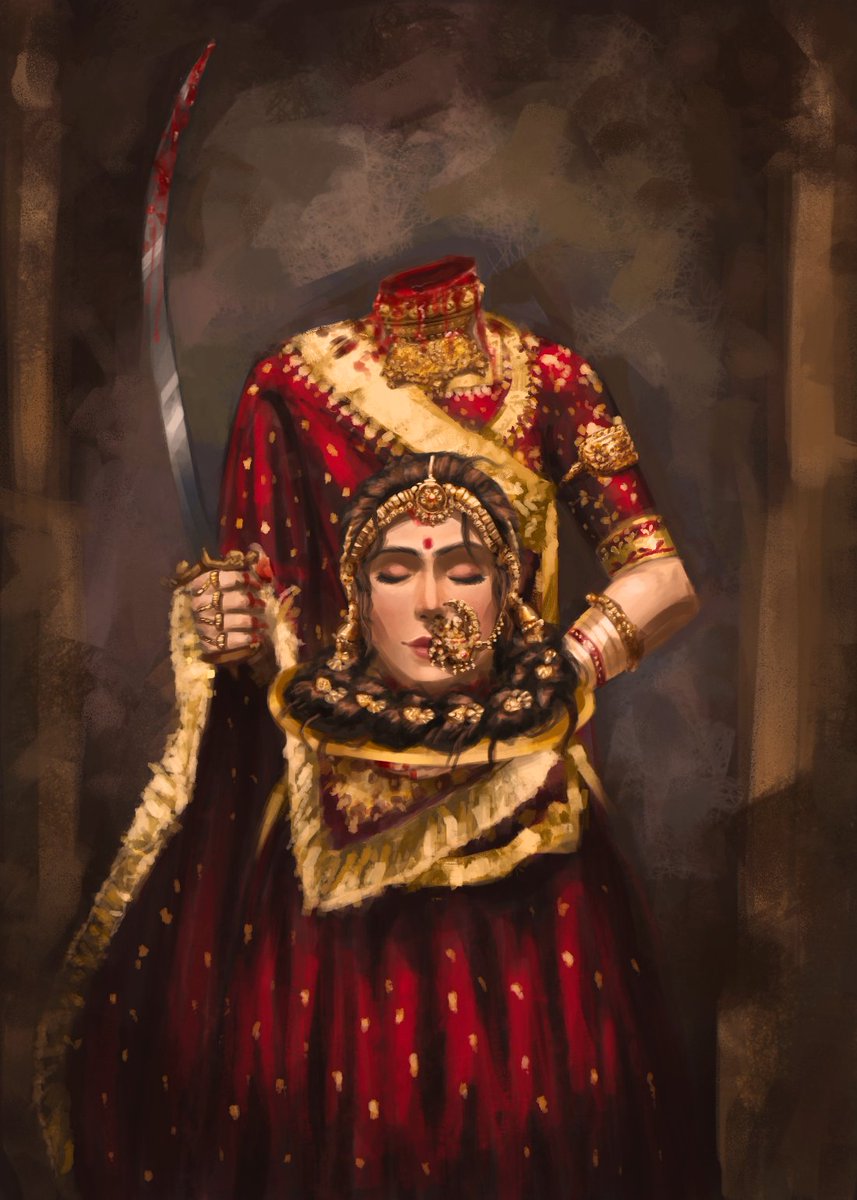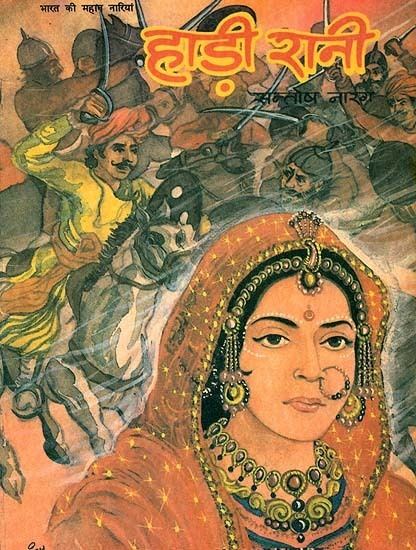Every Woman who invokes courage inside her is Durga
Evry Woman who invokes Transformation is Kali
Evry Woman who invokes Devotion is Parvati
Evry Woman who invokes Nurturing is Annapurna
Evry Woman who invokes Shiva inside her is Shakti
बिण ढाला बांको लड़े,
सुणी ज घर-घर वाह |
सिर भेज्यौ धण साथ में,
निरखण हाथां नांह ||९७||
युद्ध में वीर बिना ढाल के ही लड़ रहा है | जिसकी घर-घर में प्रशंसा हो रही है | वीर की पत्नी ने युद्ध…
में अपने पति के हाथ (पराक्रम) देखने के लिए अपना सिर साथ भेज दिया है |
उदहारण - हाड़ी रानी
As described in the above couplet from a poem etched out from the collective conscious of the people hearing of her valour for generations. Hadi Rani is a folk heroine of Rajasthan in India.The legends say that she was a daughter of a Hada Rajput married to a Chundawat chieftain of Salumbar in Mewar.
Bundi (Hadoti) is one of the most picturesque towns in Rajasthan. It is situated along a narrow gorge in the hills. Ruled by Hada Rajputs.The Hada Rajputs played a prominent role in the medieval period, particularly in the Mughal regime. It was a day of rejoicing. The chundawat sardar ratan singh was recently married to the Hadi rani of bundi.
Suddenly someone knocked the door from outside.Rawat ji got up and opened the door.A servant, bowed and told him that Aurangzeb has sent one of his general, Hasan ali khan along with 5000 foot and 3200 horseman to attack salumbhar. He has already entered mewar. Therefore, Maharana Raj singh has asked the sardar to be prepare for a battle. The mughal are approaching very fast. Chundawat sardar asked the servant to get his horse prepared.
The year was 1680, the Mughal Empire was ruled by the dreaded Emperor Aurangzeb,
his reign of terror was as reckless as it was Machiavellian. A few years prior Maharaja Jaswant Singh I of Marwar (Jodhpur) had subjugated the Afghans and given Afghanistan to the Emperor on a platter, and he was repaid with his assassination,
he was poisoned in Kabul during a victory feast and the Mughal Emperor's son, Azim was made the provincial chief. The Maharaja's queens had committed Sati on his funeral pyre, his son had died already on the battlefield, Aurangzeb's machinations were turning out perfectly,
but one of Maharaja's junior wives, Jadaman, a daughter of Mewar, refused, for she carried with herself an unborn child, a son, an only male heir, capable of preventing Marwar from falling into the evil Turk's designs.
She was rescued by Marwari Rathore noblemen and immediately escorted to her home, in Mewar, ruled by none other than her brother Maharana Raj Singh I, where the month long spring festivities were in progress.
In a bid to capture and kill the Queen and her infant, Aurangzeb brought the Mughal armies into Mewar but was thwarted, however this only further strengthened his resolve and he decided to make another reinforced attempt in the second half of the year.
He called for his sons - Azim from Kabul, Akbar from Bengal and Muazam from the Deccan, with their forces to further inflate the already large Mughal Army, the Emperor and his three sons with their combined might resolve to descend on Mewar.
 |
| Palace of Hadi Rani |
As the Empire began its march in desire of blood, Salumbar, a feudatory of Mewar was engaged in a different affair altogether. Salumbar's Chundawat Lord Rawat Ratan Singh II was getting wed to a Chauhan noblewoman of the Hada subclan, he was besotted with her.
While the post wedding rituals and formalities were in progress, Ratan Singh gets a call to arms from Mewar, he was to arrive with his forces and join Mewar's resistance against the Mughal armies, for the second time that year, loyal as always, he leaves amidst the festivities.
As the Mewari garrison is gathered to face the Mughal armies, Ratan Singh joins but keeps communicating via messengers with Salumber, specifically with his wife. He assures her that he will return and this is not the end;
as the city of Udaipur and Mewar's fortresses are evacuated of its civilian subjects, he assures her again of his return; and while the Mewari forces clash with the Mughal Armies, he assures her again,
चुण्डावत मांगी सैनाणी ।
सिर काट दे दियो क्षत्राणी ।।
"Chundawat maangi senani,
sir kaat de diyo Kshatrani"
Translation: The Chundawat (Chief) had asked for a token, and the Kshatrani gave her head.
But Chundawat sardar was still thinking about the rani. He told a servant to go this time asking for a token of hers to keep with him, in wake of the peril that had now come his way. Upon reading his message, realising that her husband will never be able to dedicate himself to his foremost duty of war as a Kshatriya, despite the threat on his life that he faces, because of his distracting affection towards her,
she goes back into her chambers and comes back with a sword, dressed in her wedding attire, writing one last reply to his letters -
"My Lord, we shall meet again, and we shall meet in Heaven"
सागर के आंसू रोई थी चम्बल की धार भी,
इससे बड़ी कथा नहीं मिलेगी प्यार की
चुण्डा को जंग जीत का आशीष दे दिया,
थाली में काट क्षत्राणी ने शीश दे दिया
The messenger watched, and as his bafflement turned into his shock, the Hadi Rani severs her head with her sword. He watches as she turns into Chhinnamasta herself, the Hindu goddess of both life, death, and self-sacrifice who severed her head for the good of mankind,
preventing the demons from gaining immortality. The messenger then prostrated, wrapped her head in red cloth and hastened to the battlefield returning the "token" from the Hadi Rani to Ratan Singh.
Devastated, Ratan Singh is overcome with in shock and despair, this is until he reads the letter. He realises his wife had performed the ritual of Jauhar, that Kshatriya women do before the men go into one last charge to death - The Saka, on an invading enemy.
Ratan Singh recollects himself, his conviction strengthened, he joins the battle for Mewar and Marwar against the Mughals with a reinforced resolve, he was to give everything, he did not have a care of life or death anymore. He ties the head to himself and races towards the battle field. Dodiya Thakur Nawal Singh of Sardargarh, Rawat Maha Singh Chundawat of Begu, Kesri Singh Chauhan of Parsoli,also attached mughals with their respective armies. The battle was historic. The mughal army could not stand long and was butchered by the rajput's sword. Dodiya Thakur Nawal Singh along with his sons Krishna Singh and and Muhakam Singh attained VeerGati. Hassan ali khan along with his rest of the troops fled.
As the war against the Mughals ensued, the military brilliance of Maharana Raj Singh and of the Marwari nobleman Durgadas Rathore prevailed over Aurangzeb and his sons' schemes.
Akbar who was sent with an artillery contingent of 50,000 to level Udaipur to the ground, to surprise the Mewaris and to divide them, instead found himself trapped and isolated. He fled with his men leaving behind their guns, many of these artillerymen were Europeans,
who lived to tell the tale after a brief capture. Muazam and Azim both were outclassed and outmaneuvered by the Mewari forces in the difficult terrain, they were forced to flee like their brother, after suffering great losses.
Aurangzeb himself had to retreat. The Mughals were defeated, they went back to Delhi, to never return to Mewar again. Ratan Singh fought valiantly, unleashing his rage and wrath on the Mughals, however he survived the peril, he was triumphant but his duty was not finished.
His wife had committed Jauhar, he was to die in the Saka, true to his Dharma and his covenant, he stabbed himself with his sword, completing the ritual, he was to join Hadi Rani in heaven, now that his Saka was complete.
Rarely does it happen that reality is indistinguishable from the unreal, rarely is the Aristotelian Mimesis defeated by the Platonic Anti-Mimesis, and even rarer is when humanity transcends into the divine.
The Hadi Rani is revered by the Mewaris and the people of Rajputana as nothing short of the divine. She became the paragon of the virtues by which Kshatriyahood is defined - honor, courage, and sacrifice.
They see her like Ratan Singh's messenger saw her, Chhinnamasta, the goddess of both immortality and death, immortalised by taking her own life.
Hadi Rani Kund located in Todaraisingh town of Tonk district of Rajasthan is one of the important tourist places in Tonk district. Hadi rani Kund located in Subhash Colony in Todaraisingh is famous for its stairs. The specialty of the stairs of this Kund (Baori ) is that whoever comes down the stairs is not able to come back from the same ladder.
Hadi Rani Kund is a favorite destination for tourists visiting the Bisalpur Dam due to its proximity to the Bisalpur Dam.
The Hadi Rani Kund at Todaraisingh was built by King Chundavat Ratan Singh of Todaraisingh to bathe his queen of Hadoti (Hadi Rani). In memory of him, this kund is named Hadi Rani Kund.
Hadi Rani Kund located in Todaraisingh town of Tonk district of Rajasthan is one of the important tourist places in Tonk district. Hadi rani Kund located in Subhash Colony in Todaraisingh is famous for its stairs. The specialty of the stairs of this Kund (Baori ) is that whoever comes down the stairs is not able to come back from the same ladder.
Hadi Rani Kund is a favorite destination for tourists visiting the Bisalpur Dam due to its proximity to the Bisalpur Dam.
The Hadi Rani Kund at Todaraisingh was built by King Chundavat Ratan Singh of Todaraisingh to bathe his queen of Hadoti (Hadi Rani). In memory of him, this kund is named Hadi Rani Kund.
Bollywood producer director Amol Palekar had come to Todaraisingh for shooting the film Paheli starring actors Shah Rukh Khan and Rani Mukherjee on Paheli, the story of Rajasthan’s famous writer Vijayadan Detha. Several scenes of Shah Rukh Khan and Rani Mukherjee were filmed on the steps of this Kund.
In the golden history of Mewar, the name Hadi Rani is known for her golden sacrifice. The credit for this victory is still given in the Yashogathao of this immortal sacrifice to the Hadi Rani in Anchalo, Rajasthan.
A women’s battalion was formed in Rajasthan Police by the Rajasthan government. After formation, this women’s battalion is named after this Veerangana, Hadi Rani Mahila Battalion















No comments:
Post a Comment